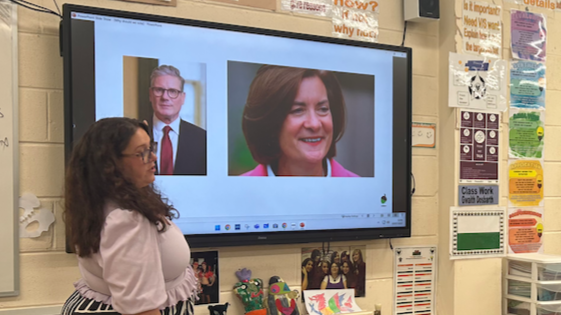
A recent survey has revealed a concerning lack of political awareness among secondary school students in Wales, prompting calls for a greater emphasis on political education in schools. The survey highlighted a significant gap in young people's knowledge of key political figures and the Welsh political system.
Shocking Lack of Recognition
Students at Birchgrove Comprehensive in Swansea were shown photographs of prominent politicians. The results were startling. A mere 8% of secondary school pupils surveyed could identify Eluned Morgan, the First Minister of Wales. Even recognition of UK Prime Minister Keir Starmer was low, with fewer than half of the students able to name him. One 15-year-old student, Thomas, admitted, "I've never seen that lady [Eluned Morgan] in my life."
Social Media as the Primary News Source
Many students admitted that their primary source of news is social media platforms like TikTok and Instagram. Jackson, 15, noted, "I feel like English politics is a lot more mainstream. It's what people think matters more. People think that Welsh politics doesn't really have an effect even though it does." He further explained that the recent implementation of the 20mph speed limit was the first time many of his peers realized that Wales could independently create its own policies. Jackson also pointed out the generational shift in news consumption, saying, "It's quite weird because I feel like a lot of the political news is still in things like newspapers and no one under the age of 45 reads newspapers."
Concerns About Future Voter Turnout
The lack of political awareness raises serious concerns about voter turnout among young people. Lottie, 15, expressed her worry, stating, "I think it is quite concerning obviously because when you're 16 in Wales you can legally vote. So if people don't know who she [Morgan] is then they're not going to vote." Carol Taylor, a teacher at Birchgrove Comprehensive, echoed this sentiment, emphasizing the need for political education in schools. She noted that many parents may not vote themselves, leaving students uninformed about the political process. She added, "At the minimum, they'll be voting in the council elections within two years, and they have absolutely no idea about council elections. They probably won't turn up to vote."
Confusion Between American and British Politics
Adding to the concern is the apparent confusion among students regarding American and British politics. Ms. Taylor observed, "A lot of our pupils are very very confused about American and British politics. Donald Trump is on their newsfeed very regularly. They're very aware of him and they think he's really funny." This highlights the need for clearer distinctions and education on the different political systems.
Calls for Action
The Children's Commissioner for Wales, Rocio Cifuentes, is advocating for a stronger focus on politics in schools. She argues that shielding children from political discussions does them a disservice. "We're brought up on this notion that politics is a dirty word or something not to be discussed at the dinner table, but we are really doing children and young people a disservice by not educating them effectively on these topics," she said. The Commissioner's report also urges political parties to actively engage with young people in the lead-up to the next election. She also suggested the need for media geared towards young people, stating, "For example, there is currently no Wales-specific equivalent to Newsround which many of the children and young people we've spoken to use to get their information."
The Missed Opportunity of 2021
In 2021, 16-year-olds were granted the right to vote in Senedd and local government elections in Wales. However, Richard Wyn Jones from The Wales Governance Centre believes that the Covid-19 pandemic hampered efforts to educate young people about politics in the lead-up to the election. He suggested that 2021 was a "false start" and that efforts need to be renewed to engage young voters.
Starting Political Education Earlier
Mr. Jones stressed the importance of introducing political education at a younger age, rather than waiting until the final years of schooling. "This is somehow something that people are slightly suspicious of and I think that's a problem because I think you need to start earlier," he said. "I think you need to try and inculcate people into an understanding of the structures of governance, how you can engage in those structures." According to the Welsh election study by the Wales Governance Centre, only 28% of 16 and 17-year-olds who participated said they had discussed voting with someone at school, or in a youth club or society in the run-up to the last election.
Government Response
A spokesperson for the Welsh government stated that they are committed to supporting young people's participation in the democratic process. "We fund organisations to deliver projects in the classroom to support young people to participate in the democratic process," the spokesperson said. "This includes sessions which bring together young people and elected representatives."
The challenge remains to effectively engage young people in Welsh politics, ensuring they are informed and empowered to participate in the democratic process. Failing to do so risks further disengagement and a weakening of democratic participation among future generations.
0 Response to "Never seen that lady in my life, pupils say of FM"
Post a Comment